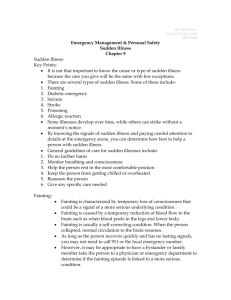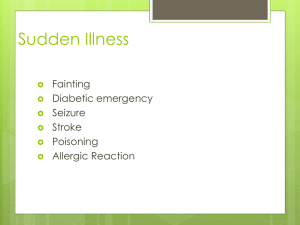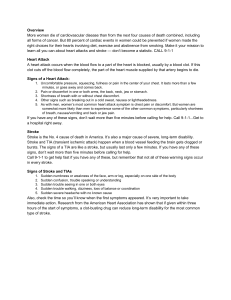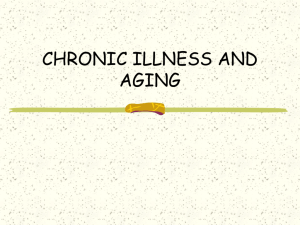Sudden Illness
advertisement
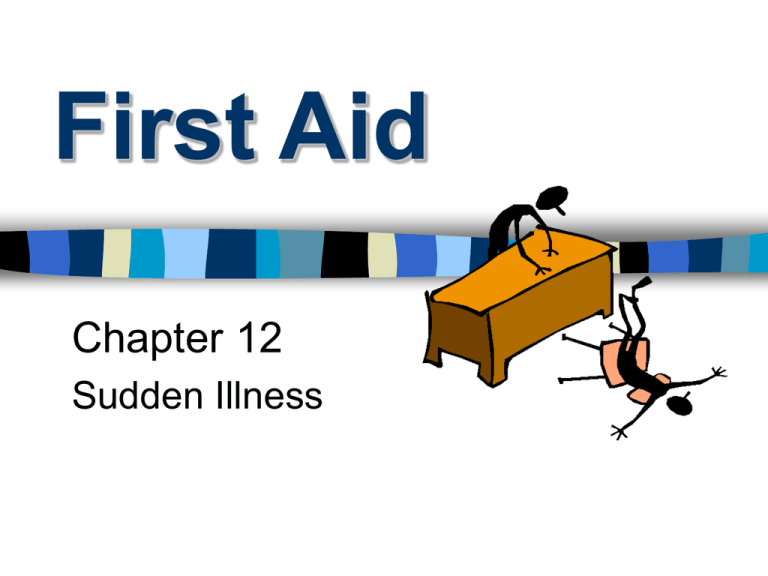
First Aid Chapter 12 Sudden Illness Heart Attack Blood supply to heart is reduced or stopped Coronary artery is blocked by obstruction or spasm Heart Attack: What to Look For Possible S&S: Uncomfortable pain, pressure, fullness or squeezing the chest Pain spreading to shoulders, neck or arms Chest discomfort with lightheadedness, fainting, sweating, nausea or SOB Heart Attack: What to Look For Warning signs may be difficult to detect. If suspect, do not delay SMA Medical care crucial to survival Heart Attack: What to Do Call EMS Monitor ABCs Keep sitting up Loosen tight clothing Be calm and reassuring Heart Attack: What to Do Nitroglycerin? Dilates coronary vessels, increasing blood flow to heart, decreases B/P May repeat up to 3 doses in 10 minutes Angina Chest pain Brought on by physical exertion, stress, Rarely lasts longer than 10 minutes Relieved by nitroglycerin Stroke CVA Blood vessels that deliver O2 to the brain rupture or become obstructed Nerve (brain) cells die Effects often are permanent Stroke: TIA Transient Ischemic Attack Symptoms similar to CVA but last only 5 minutes to several hours “Mini Strokes” Warning sign of possible stroke Stroke: What to Look For Weakness,numbness, paralysis of face, arm, leg or one side of body Blurred or decreased vision Dizziness or loss of balance Sudden, severe, unexplained HA No PEARL Stroke: What to Do Check ABCs Call EMS Conscious: Lay down with head and shoulders elevated Unconscious: Recovery position Asthma Coughing Cyanosis Unable to speak w/o pausing for breath Wheezing Asthma: What to Do Check ABCs Keep upright Medication? SMA as needed Hyperventilation Fast, deep breathing May be due to stress Hyperventilation May have: Dizziness Tingling of hands and feet SOB Breathing rate faster than 40/min Hyperventilation What to do: Calm & reassure Inhale thru nose, exhale thru lips Don’t use paper bag Fainting Associated with decreased blood flow to brain. May be due to: Low blood sugar Anxiety Fatigue Dehydration Anemia Fright Drugs Arrhythmia Heat exhaustion Bleeding Fainting May also be due to: Sitting or standing in one place for long period of time. Fainting:What to Look For Dizziness Weakness Seeing spots or floaters Blurred vision Ringing in the ears Nausea Pale skin Sweating Fainting:What to Do Prevent from falling Lay down and elevate legs Loosen tight clothing Provide fresh air and cool wash cloth for face Provide a cool, sweet drink when able to swallow Do Not: Splash water on face Slap face Use smelling salts Fainting Usually not serious SMA only if: Over 40 y/o Repeated attacks Does not waken in 4-5 minutes LOC while sitting or lying down Seizures Abnormal stimulation of brain cells Causes: Epilepsy Heat stroke Poisoning Electric shock Hypoglycemia High fever Brain injury, stroke Drug w/drawal, abuse or overdose Seizures: What to Do Cushion and protect head Loosen tight clothing Look for medical alert tag Turn to side when seizure ends Do NOT: Hold down Put anything in the mouth Seizures: What to Do SMA only if: No hx of seizures Lasts more than 5 minutes Difficulty breathing after Pregnant Signs of injury Diabetic Emergency Insulin is lacking or ineffective Insulin: Hormone produced by pancreas Helps body use energy in food Regulates sugar in blood stream Diabetes: 2 Types Type I: Juvenile onset or insulin dependent: Requires insulin injection Type II: Adult onset or non-insulin dependent. Overweight. Diet controlled. Low Blood Sugar Hypoglycemia Too much insulin Too little food 45 Low Blood Sugar: S&S Sudden onset Staggering, Trembling Anger, bad temper Pale color Confusion Hunger Eventual LOC Low Blood Sugar: What to Do Give sugar such as candy or fruit juice SMA if no improvement in 15 minutes High Blood Sugar Hyperglycemia Too much sugar in blood Not enough insulin 245 High Blood Sugar: S&S Gradual onset Drowsiness Thirst Frequent urination Flushed skin Vomiting Fruity breath odor Eventual LOC High Blood Sugar: What to Do If not sure if high or low blood sugar: Give sugar such as candy or fruit juice SMA if no improvement in 15 minutes Learning Activities 12 Sudden Illness 1. Heart attack victims experience least amount of pain when laying down. No Learning Activities 12 Sudden Illness 2. Sit or lay down to take nitroglycerin tablets. Yes Learning Activities 12 Sudden Illness 3. Elevate head for stroke. Yes Learning Activities 12 Sudden Illness 4. Most asthma victims have inhaler. Yes Learning Activities 12 Sudden Illness 4. Hyperventilation: encourage to breath slow, hold inhaled air for several seconds, exhale slow. Yes Learning Activities 12 Sudden Illness 6. Splash water on person who has fainted. No Learning Activities 12 Sudden Illness 7. Fainting: use ammonia or smelling salts. No Learning Activities 12 Sudden Illness 8. Place stick in mouth of seizure victim. No Learning Activities 12 Sudden Illness 9. Seizure victim always requires medical attention. No Learning Activities 12 Sudden Illness 10. If in doubt about high or low blood sugar, give sugar. Yes Learning Activities 12 Sudden Illness 11. Diabetic emergency with no improvement in 15 minutes: SMA. Yes Learning Activities 12 Scenerio: C/O chest pain. Started 1 hour ago. Feels silly complaining. Nauseated. Pressure in chest. What to do? Call EMS Monitor ABCs Sit up Nitroglycerin if available Learning Activities 12 Scenario: Coworker suddenly collapses. Confused, numbness, paralysis on one side. C/O severe HA earlier. What to do? Check ABCs Call EMS Lay down with head elevated Learning Activities 12 Scenario: Watching bloody video. Falls to floor. Breathing, has pulse, unresponsive. No other injuries from fall. What to do? Elevate legs 8-12 inches Loosen tight clothing Wet, cold cloth to head SMA only if does not regain consciousness Learning Activities 12 Scenario: See co-worker holding down another employee on floor. Trying to force pencil btw teeth. Victim unresponsive with muscle jerks. . What to do? No object btw teeth!! Cushion head Loosen tight clothing. Turn to side after SMA only if: No hx of seizures, Lasts more than 5 minutes Difficulty breathing after, Pregnant Learning Activities 12 Scenario: Car pool driver driving fast and erratically, stops to let rider out, confused, slumps over steering wheel. Skin cold and sweaty. You know she is diabetic . What to do? Give something sweet ot eat. SMA if no improvement in 15 minutes First Aid Kits Item Piece of candy Quantity 1 Something easy to eat (not hard candy and not chocolate because it will melt)

